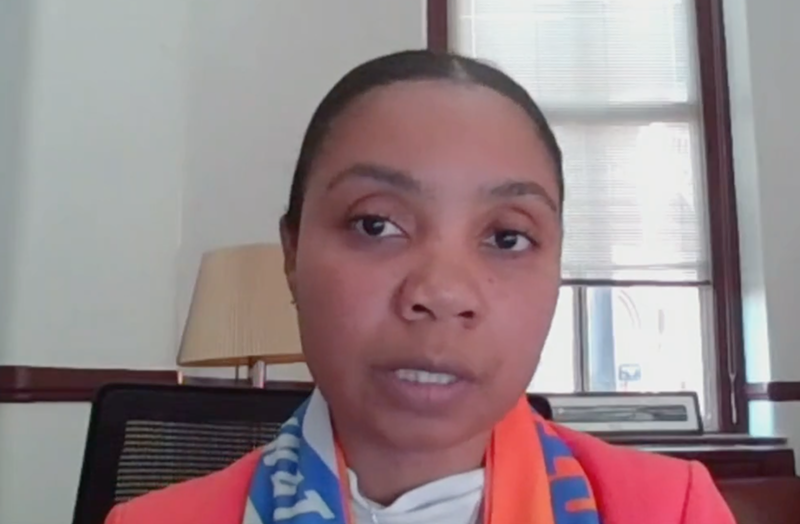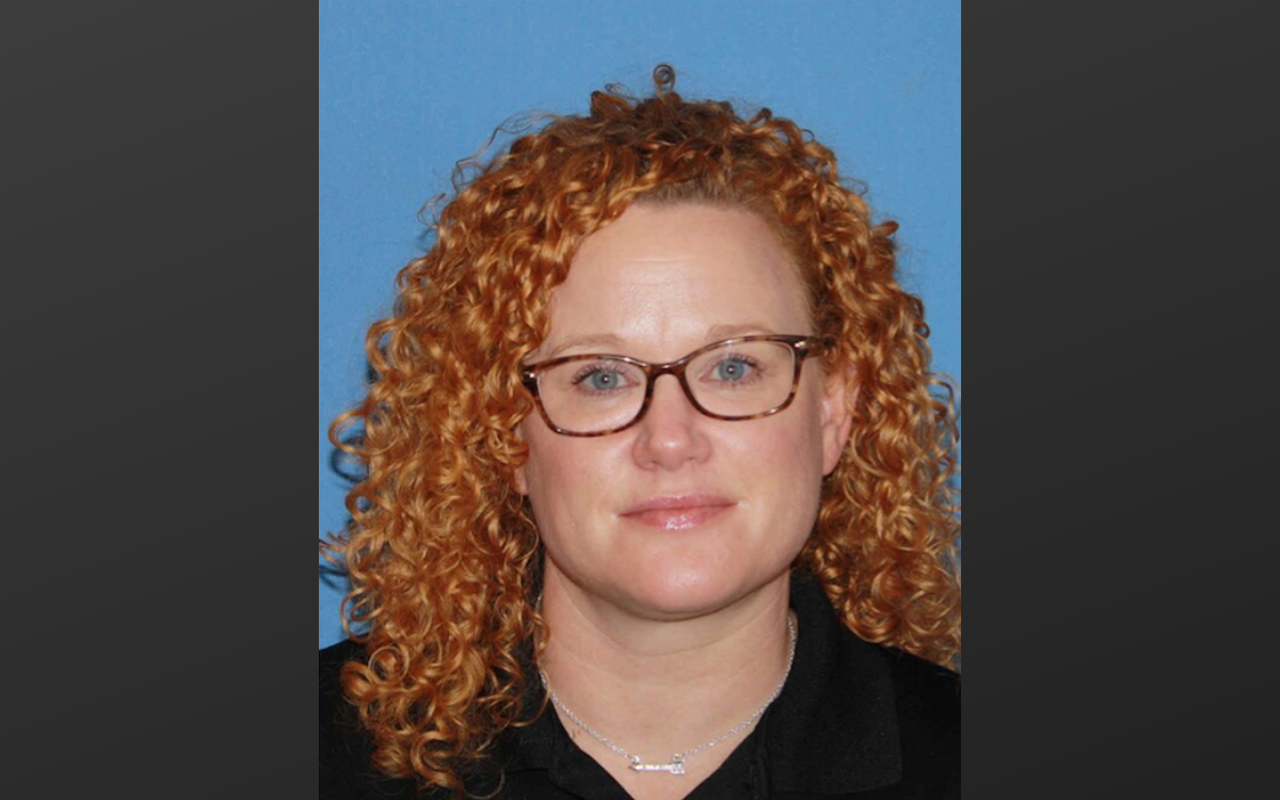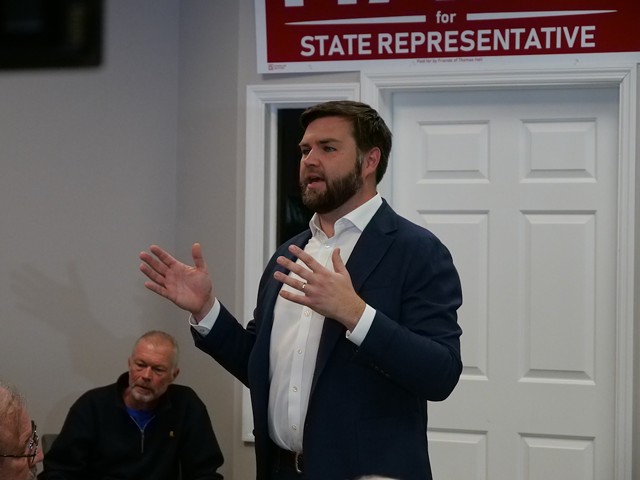
Photo: facebook/cityofcincy
During a virtual public meeting on Oct. 20, 2022, Cincinnati city manager Sheryl Long explains a new policy that outlines discipline for city employees who use racist slurs.
Cincinnati government officials are finally enacting a new policy regarding city employees' use of racial slurs after several police officers recently used the N-word and other insults while on duty.
During an Oct. 20 public meeting, city manager Sheryl Long shared that through administrative regulation 25, the city's non-discrimination policy will ensure that city employees who use the slur "n*****" (a racist term for Black people, typically used disparagingly by white people) while on duty automatically will be investigated and possibly fired. City employees who use other racial or ethnic slurs while on duty will be investigated, be placed on at least 40 hours of unpaid suspension and may be fired.
Long said that the administrative policy goes into effect Oct. 21, though conversations about logistics such as policy distribution and employee training will continue. The policy applies to both union and non-union city employees.
"First I want to make it clear to everyone – the city's employees and our citizens – that the use of any hateful or hurtful language by our employees while they are serving the public is completely unacceptable to me," Long said. "It is a privilege to serve our citizens, and our employees must act that way. The recent use of the N-word by multiple city employees deeply concerns me."
As city manager, Long has the authority to make changes to administrative regulations for city employees without the vote of Cincinnati City Council, which operates instead under the city charter. As such, council members are not required to adhere to Long's policy, but Long noted that she held one-on-one conversations with each member about her plan.
Long also collected feedback from community members during a meeting in September, not long after several Cincinnati Police Department officers were found to have used slurs while on duty. That feedback informed portions of the new policy, Long said.
What's in the new policy?
The policy puts the toughest punishments onto employees who use the N-word, Long said. Several Cincinnati Police Department officers have used the term in various ways while on duty, including Rose Valentino, who was fired after an investigation.
"The change I am making is simple," Long said. "I am making it clear that if a city employee uses the N-word while on duty, it will be investigated no matter what. For the use of the N-word, an employee will face termination unless they can prove that their use of the word was non-discriminatory."
Long said that there may be rare instances when an employee may not be fired for using that slur while on duty if the employee can prove that they were not using it in a discriminatory way, noting that this allows the city to hear each case individually.
"For example, we recently had a case where a police officer on an off-duty detail used the N-word when he told a drunk person to stop calling an officer the N-word," Long said, recalling a September incident with a Black officer. "The incident was investigated and the officer was not fired because the use was not hateful."
Long also mentioned city employees being prohibited from using other slurs while on the job.
"The use of any other racial, ethnic or discriminatory slur or gesture by a city employee on duty will remain unacceptable," Long said. "These uses will also be investigated. If the use of the word is discriminatory, the employee will face a minimum of 40 hours unpaid suspension up to the possibility of termination."
According to an August report from CPD, officer Kelly Drach was suspended for seven days after multiple incidents of using the slur "Sand n*****." The cloaked phrase is often used against people who are Middle Eastern or people who appear to be Middle Eastern.
Investigators working these cases are free to examine the cases fully and independently without fear of retaliation from the city, Long said. Human resources director Ed Ramsey said that was a big achievement in the code language.
"From the HR perspective, I'd like to echo the fact that we are clearly trying to put all of our employees on notice to satisfy some of our due process requirements. This is our need to balance that aspect with our expectations with the enforceability of the policy overall," Ramsey said. "We have to comply with our contractural obligations with the unions and create an environment where we have fair and thorough investigations that lead to progressive discipline – the same process for everybody and if in rare instances where it calls for mitigating circumstances, then we may have some different outcomes. I'd also like to say that I'm particularly happy with the part where we've insulated our investigators from the chain of command."
Iris Roley, the collaborative agreement sustainability consultant, said during the meeting that the city had previously talked about a true zero-tolerance policy for hateful slurs. She asked Long, Ramsey and city solicitor Emily Woerner why that had changed and why only the N-word had more intense consequences than other terms.
"The N-word has been the problem word. I mean, if you look back to the majority of the disciplines that we've had and the things that you've seen on the news, it has been because of the use of the N-word," Long replied. "We had this conversation and honestly, the [number of] terms [slurs] that are out there that some people could use [offensively] is so massive that we wanted to talk about the situation at hand, and it has been the N-word."
"And to make it clear, while we're focusing on the N-word to highlight that that will lead to a presumption of termination. The use of any other racial slur depending on the circumstances can still result in termination," Woerner said. "So the N-word is an automatic presumption of termination. All others, it would be a minimum of a 40-hour unpaid suspension up to a termination, depending on the facts."
Woerner also said that language is evolving and people may not know that some words are slurs.
"I think as far as other slurs go, what we have discussed internally is there are times where I think people, for some words, can be honestly ignorant to the hurtfulness nature of the word," Woerner said. "And so we wanted to make sure that we could consider that as our language evolves and people become more aware of what certain words are. "
Roley also wondered about how rare it might become that the city decides not to fire someone for using the N-word while working.
"I did want to say that when we did look across the country that this particular language goes beyond what we've seen in other cities, so thank you for having the courage to go beyond," Roley said. "But is this going to get us to zero tolerance without exceptions? I think it's the mitigating factors that I'm just waffling with a little bit and trying to better understand it."
Ramsey said that some aspects of policy must be determined on a case-by-case basis according to fairness and legal defense.
"I would just highlight the fact that the mitigating factors are to some extent a necessary evil. They are going to be rare," Ramsey said. "But as soon as you take away any discretion from a policy, you take away the fairness and the thoroughness of the investigation that is demanded by just cause. So we do have to consider those things to ensure fairness of due process in the situation. To the point, we don't have a lot of examples because these are going to be such rare, rare instances."
Roley has suggested additional language to require a review of the policy's effectiveness a year from rollout. Long said she will take it under advisement.
Unions may push back
Long said that some employees may have issues with the new code language.
"At the end of the day, a change is a change, right?" she said. "We have great employees who work for the city. They don't want to work in a culture to where this is a problem. There's always people when you're changing policy, it always has a little bit of a pushback."
Ramsey said that unions will continue to review the policy and address concerns.
"I'd just like to add about pushback and resistance, yes, we will absolutely get some from the unions because it is their job to defend all employees even when they know they are wrong, just as a public defender may defend a guilty person for things like process and things like that," Ramsey said. "The unions absolutely have to defend anybody we charge. It doesn't mean they agree with the underlying action, but it does mean that they have to do their job."
Ramsey said that unions represent about 80% of the city's employees.
"There is one union that did ask for a little bit more discussion, and I will have that discussion with them," Ramsay said. "But there will be some education of the staff required. We'll have to send it out citywide, talk to people and probably do some training for 6,000 employees. [That] may take quite some time, but it's the kind of training that we need to be doing routinely anyways."
Ramsey is working with other departments to plan and facilitate training on the new policy. Training will focus on legal compliance – "things you can't say, what creates a hostile work environment, sexual harassment is also covered in this policy, those sorts of things," Ramsey said – and creating a less discriminatory environment overall.
"We currently do have the staff to do that sort of training that is frankly the sort of thing we all learned in kindergarten; we just evidently need reminders of every once in a while," Ramsey said. "So the more training like that we can do and then pushing out this policy alongside of it to go through the nuts and bolts of the process, of the penalties, of the violations, things like that are the kind of trainings that I would expect my shop to be pushing out soon.
Cincinnati Police Department will be on board
"It doesn't go unnoticed by me or anybody on this call, I'm sure, that the police department specifically has had three instances of racial slurs being used by on-duty officers within the last six months," CPD interim police chief Teresa Theetge said. "There's a lot of things I can defend with [what] an officer does or says, but the use of a racial slur is not one of them."
Theetge talked further about the "higher standard" that police and other first responders must meet to earn the public's trust.
"We say to our officers all the time from day one, police are held to a higher standard. We carry a tremendous amount of authority by the positions that we hold, and so they have to be held to a higher standard," Theetge said. "Couple that with the fact that we are, I believe, the only city employees that wear body cameras, so what we do every day gets captured and memorialized, and they know that. They've been wearing the cameras long enough, since 2016, so they know that. So they know now that there is no tolerance for this, but the facts will be reviewed and determined before the discipline's administered."
Ramsey said that the Cincinnati Police Department will receive training on the new policy, but that the logistics haven't been determined yet.
"I would think that the chief and I would work to basically be giving the same training to everybody," Ramsey said. "I mean, the policy is for everybody, so we'll have a standardized training that we roll out and there may be some more specific instances we need to customize for some individual department or something. But the chief and I have not talked about it at the moment.
Theetge said that CPD currently is required to have three CPT – or continued professional training – days per year, with the state of Ohio often dictating what must be covered. She said that she will work with Ramsey, the police academy and others to institute non-discrimination topics into those training hours.
"That's the area where I will work with Ed to determine how can we fit something that is as significant as this into the available hours that we have to train our officers," Theetge said. "And when we do that, it's every single sworn officer on the department has to go through CPT training annually. So we do have their attention several times a year to continue to impress this message upon them."
Stay connected with CityBeat. Subscribe to our newsletters, and follow us on Facebook, Instagram, Twitter, Google News, Apple News and Reddit.
Send CityBeat a news or story tip or submit a calendar event.










